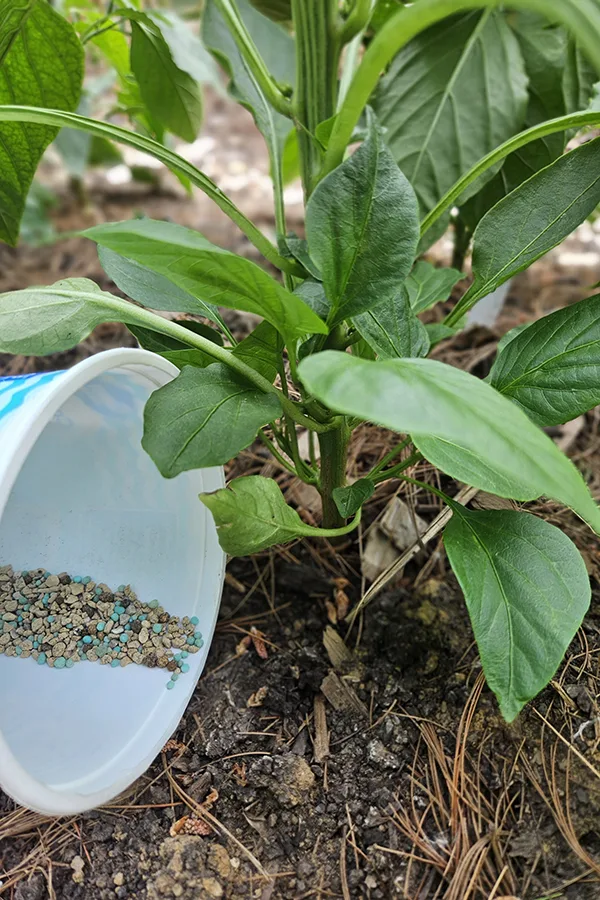Explore the Best Fertilizers for Peppers and Enhance Your Garden's Yield
Explore the Best Fertilizers for Peppers and Enhance Your Garden's Yield
Blog Article
Organic Vs. Synthetic Fertilizers: Which Is Best for Nurturing Healthy And Balanced Pepper Plants?
In the world of supporting healthy and balanced pepper plants, the option between synthetic and organic fertilizers stands as an essential decision with far-reaching effects. While both alternatives goal to offer essential nutrients to sustain plant development, the subtleties of their effect on the soil, plant health, and the setting stimulate an argument that mirrors throughout the horticulture community. Understanding the distinct benefits and possible risks of each plant food type is critical for pepper cultivators seeking to maximize their returns while keeping a sustainable and eco-conscious technique.
Benefits of Organic Plant Foods
Organic fertilizers supply an environmentally-friendly and lasting method to beneficial pepper plants, supplying vital nutrients without making use of artificial chemicals. These all-natural fertilizers are stemmed from natural resources such as compost, manure, bone dish, and seaweed, advertising dirt health and wellness and biodiversity. Unlike synthetic plant foods, organic choices launch nutrients slowly, making certain a stable and well balanced supply for pepper plants to grow.
One significant advantage of natural fertilizers is their capability to boost soil structure and water retention. By boosting dirt health and wellness, natural fertilizers advertise useful microbial task, which helps in nutrient uptake by pepper plants. Additionally, natural plant foods reduce the danger of chemical run-off, shielding water sources from pollution and safeguarding the atmosphere.
In addition, organic fertilizers add to lasting dirt fertility by advertising the development of advantageous dirt microorganisms. These organisms assist damage down natural issue, releasing nutrients in a form that is quickly available to pepper plants. best fertilizers for peppers. By promoting a healthy and balanced dirt ecosystem, organic fertilizers support sustainable pepper cultivation practices that benefit both plants and the atmosphere
Disadvantages of Synthetic Fertilizers
Synthetic fertilizers, in contrast to their natural equivalents, present various disadvantages when made use of to nurture pepper plants, impacting both plant health and ecological sustainability. One major disadvantage of synthetic plant foods is their propensity to leach nutrients from the soil promptly.
Moreover, the overuse of artificial plant foods can contribute to water air pollution. Excess fertilizers not absorbed by plants can remove into water bodies, leading to eutrophication, where algae blossoms deplete oxygen degrees in the water, hurting water life. Additionally, synthetic plant foods are commonly originated from non-renewable sources, such as fossil fuels, adding to carbon discharges and ecological destruction throughout their production.
Nutrient Absorption Comparison
When contrasting synthetic and natural plant foods in terms of nutrient absorption, natural fertilizers have the benefit of supplying an extra balanced and slow-release source of nutrients. Organic fertilizers consist of a selection of macro and micronutrients that are not just useful for the plants but also promote healthy soil microbial activity, which aids in nutrient uptake.
Additionally, organic fertilizers improve soil structure and water retention capability, enabling pepper plants to gain access to nutrients a lot more effectively. This enhanced soil top quality helps with root growth, making it possible for better nutrient absorption. Synthetic fertilizers, although originally enhancing plant development as a result of their high nutrient focus, he has a good point might prevent lasting nutrient absorption by derogatory soil health in time.
Ecological Effect Considerations

On the various other hand, synthetic plant foods, although typically more focused and right away available to plants, can have damaging impacts on the atmosphere if not applied appropriately (best fertilizers for peppers). Their production calls for high energy inputs, bring about greenhouse gas emissions and adding to climate adjustment. The runoff of excess synthetic fertilizers can contaminate water resources, leading to eutrophication and harming water ecological communities.
Finest Plant Food Practices for Peppers
When fertilizing pepper plants, optimizing nutrient uptake and lessening ecological influence are key considerations. To accomplish this, it is essential to follow best plant food practices tailored to the particular requirements of pepper plants. One vital technique is to execute a dirt test before using any type of plant blog here foods. This examination can establish the pH degree of the dirt and recognize any kind of nutrient shortages, leading you in picking one of the most ideal plant food solution.
Another essential method is to fertilize pepper plants at the correct time. Commonly, peppers benefit from receiving fertilizer at growing and afterwards once again when they start to flower. Over-fertilizing can cause vitamins and mineral imbalances and harm the plants, so it is essential to adhere to suggested application rates.
Furthermore, choosing a balanced plant food with an NPK proportion that suits look at here pepper plants' demands is essential. Ultimately, integrating organic and synthetic plant foods carefully can assist nurture healthy and balanced pepper plants while decreasing ecological influence.
Conclusion

Organic fertilizers use a lasting and environmentally-friendly strategy to beneficial pepper plants, offering important nutrients without the usage of synthetic chemicals. Unlike synthetic plant foods, natural options release nutrients gradually, ensuring a well balanced and steady supply for pepper plants to prosper.
Synthetic plant foods, in comparison to their organic equivalents, position various negative aspects when made use of to nurture pepper plants, impacting both plant health and environmental sustainability. When contrasting natural and artificial plant foods in terms of nutrient absorption, organic plant foods have the advantage of giving a much more balanced and slow-release source of nutrients.Additionally, natural plant foods boost dirt framework and water retention ability, allowing pepper plants to gain access to nutrients more successfully.
Report this page